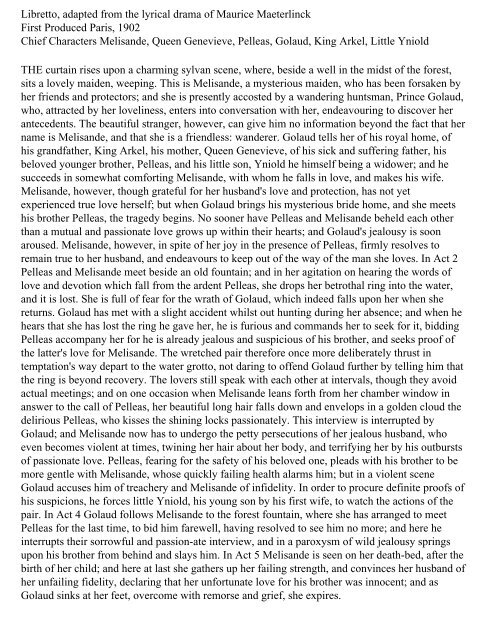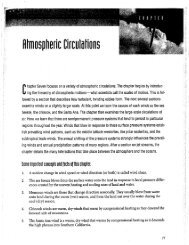Opera Plots I - MDC Faculty Home Pages
Opera Plots I - MDC Faculty Home Pages
Opera Plots I - MDC Faculty Home Pages
Create successful ePaper yourself
Turn your PDF publications into a flip-book with our unique Google optimized e-Paper software.
Libretto, adapted from the lyrical drama of Maurice Maeterlinck<br />
First Produced Paris, 1902<br />
Chief Characters Melisande, Queen Genevieve, Pelleas, Golaud, King Arkel, Little Yniold<br />
THE curtain rises upon a charming sylvan scene, where, beside a well in the midst of the forest,<br />
sits a lovely maiden, weeping. This is Melisande, a mysterious maiden, who has been forsaken by<br />
her friends and protectors; and she is presently accosted by a wandering huntsman, Prince Golaud,<br />
who, attracted by her loveliness, enters into conversation with her, endeavouring to discover her<br />
antecedents. The beautiful stranger, however, can give him no information beyond the fact that her<br />
name is Melisande, and that she is a friendless: wanderer. Golaud tells her of his royal home, of<br />
his grandfather, King Arkel, his mother, Queen Genevieve, of his sick and suffering father, his<br />
beloved younger brother, Pelleas, and his little son, Yniold he himself being a widower; and he<br />
succeeds in somewhat comforting Melisande, with whom he falls in love, and makes his wife.<br />
Melisande, however, though grateful for her husband's love and protection, has not yet<br />
experienced true love herself; but when Golaud brings his mysterious bride home, and she meets<br />
his brother Pelleas, the tragedy begins. No sooner have Pelleas and Melisande beheld each other<br />
than a mutual and passionate love grows up within their hearts; and Golaud's jealousy is soon<br />
aroused. Melisande, however, in spite of her joy in the presence of Pelleas, firmly resolves to<br />
remain true to her husband, and endeavours to keep out of the way of the man she loves. In Act 2<br />
Pelleas and Melisande meet beside an old fountain; and in her agitation on hearing the words of<br />
love and devotion which fall from the ardent Pelleas, she drops her betrothal ring into the water,<br />
and it is lost. She is full of fear for the wrath of Golaud, which indeed falls upon her when she<br />
returns. Golaud has met with a slight accident whilst out hunting during her absence; and when he<br />
hears that she has lost the ring he gave her, he is furious and commands her to seek for it, bidding<br />
Pelleas accompany her for he is already jealous and suspicious of his brother, and seeks proof of<br />
the latter's love for Melisande. The wretched pair therefore once more deliberately thrust in<br />
temptation's way depart to the water grotto, not daring to offend Golaud further by telling him that<br />
the ring is beyond recovery. The lovers still speak with each other at intervals, though they avoid<br />
actual meetings; and on one occasion when Melisande leans forth from her chamber window in<br />
answer to the call of Pelleas, her beautiful long hair falls down and envelops in a golden cloud the<br />
delirious Pelleas, who kisses the shining locks passionately. This interview is interrupted by<br />
Golaud; and Melisande now has to undergo the petty persecutions of her jealous husband, who<br />
even becomes violent at times, twining her hair about her body, and terrifying her by his outbursts<br />
of passionate love. Pelleas, fearing for the safety of his beloved one, pleads with his brother to be<br />
more gentle with Melisande, whose quickly failing health alarms him; but in a violent scene<br />
Golaud accuses him of treachery and Melisande of infidelity. In order to procure definite proofs of<br />
his suspicions, he forces little Yniold, his young son by his first wife, to watch the actions of the<br />
pair. In Act 4 Golaud follows Melisande to the forest fountain, where she has arranged to meet<br />
Pelleas for the last time, to bid him farewell, having resolved to see him no more; and here he<br />
interrupts their sorrowful and passion-ate interview, and in a paroxysm of wild jealousy springs<br />
upon his brother from behind and slays him. In Act 5 Melisande is seen on her death-bed, after the<br />
birth of her child; and here at last she gathers up her failing strength, and convinces her husband of<br />
her unfailing fidelity, declaring that her unfortunate love for his brother was innocent; and as<br />
Golaud sinks at her feet, overcome with remorse and grief, she expires.













